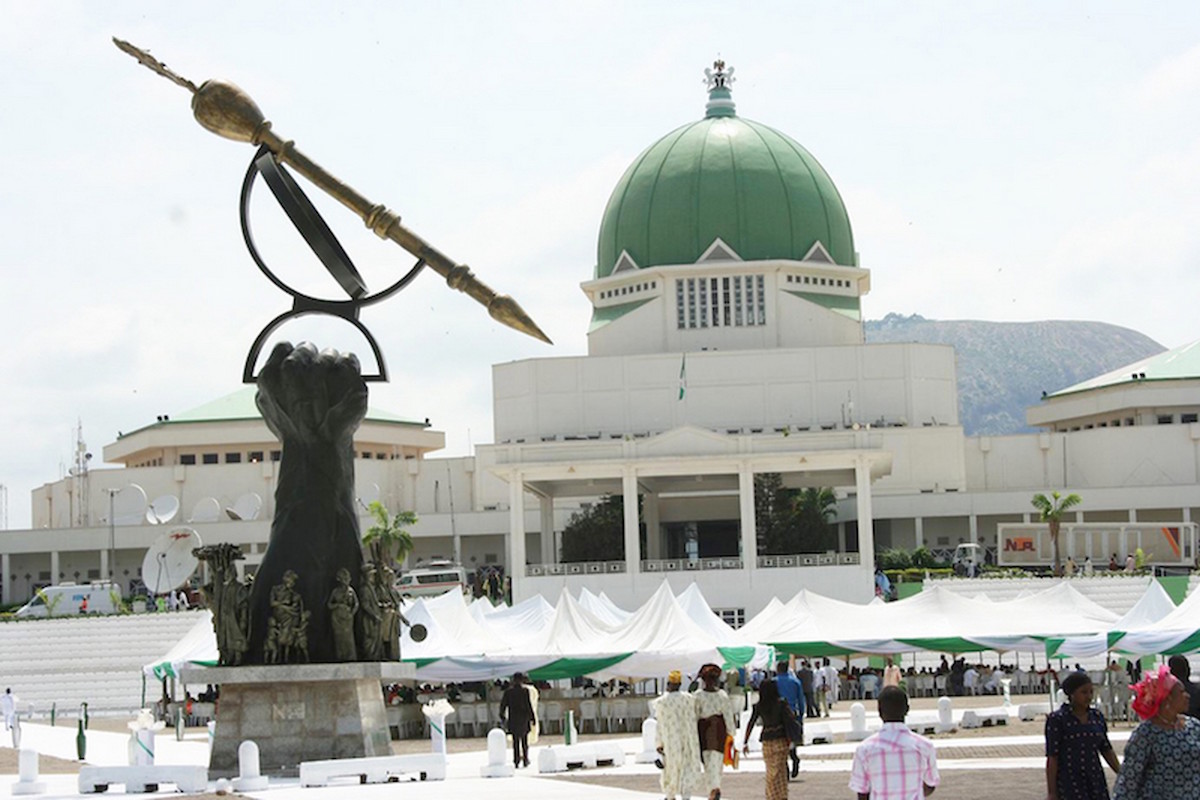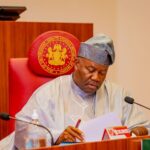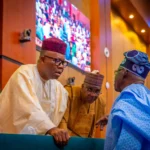The two chambers of the National Assembly are pushing for more funding for the legislature, complaining that the money meant for running that arm of government is inadequate.
This is even as some Nigerians insist that the N134bn allocated to the legislature in the 2021 budget is too much and unjustifiable. There have also been concerns over continued secrecy around the expenditures of the federal lawmakers.
- EXCLUSIVE: Why I recommended Bawa for EFCC job – Malami
Despite N134bn allocation, senators, reps seek more funds
Checks by Daily Trust indicate that the budgetary allocation to the National Assembly had risen from N23.3bn in 2003 to N134bn this year.
Twice the spokesperson of the House of Representatives, Benjamin Kalu (APC, Abia), cried out that the parliament was broke and could not afford to carry out its constitutional mandate effectively.
On Thursday, the lawmaker said the budget of the National Assembly should be reviewed upward to enable it cope with the situation.
“Yes, the House is broke. I said it before and I am saying it again. I am not afraid of saying it.
“This is the fact. The appropriation made for the running of the National Assembly, which was done when the exchange rate of the naira to dollar was N180, is less now than what it used to be. The dollar equivalent today has gone up to over N400. The purchasing power of the budget as it is now is weaker than it was 10 years ago,” Kalu said.
But despite the complaint over funds, the lawmakers have been going on with their legislative activities the usual way, aside the cut in sitting days for plenary.
A senior staff of the National Assembly who spoke on the condition of anonymity yesterday, said paucity of funds for the law-making body would have manifested in the inability to conduct activities of committees, which he said was capital intensive.
“Plenaries do not have financial implications, unlike committee sittings. Committees are where funds are needed to hire consultants, do advertorials, provide refreshment and allowances for members. If they claim that the NASS is broke, that is where it should manifest,” he said.
Jumbo package
Aside their salaries, each senator gets N13.5million monthly, while every member receives N8.5m as running cost per month.
During the last Assembly, Senator Shehu Sani, who represented Kaduna Central, opened up on their earnings. He said aside the running cost, they earned N750,000 monthly as consolidated salary.
“What I am saying is that that money (N13.5m per month) must be receipted for what you do with it. What you are given to spend without any accountability is N750,000.00.
“The constituency project itself is given on a zonal basis and almost every senator will go with a constituency fund of about N200m; but it is not the cash that is given to you.
“You will be told that you have N200m with an agency of government for which you will now submit projects equivalent to that amount. And it is that agency of government that will do those projects for you,” he said in 2018.

Why we are broke – Lawmakers
Some federal lawmakers have blamed the lack of funds to carry out legislative activities on insufficient budgetary provisions, poor releases of allocations, as well as constant pressure from constituents to deliver the responsibilities of the executive instead of their main mandate of making laws.
A lawmaker, who preferred not to be mentioned, said despite the first line charge budgetary provision for the National Assembly, releases had been erratic, while alternative ways of raising funds from agencies were not effective.
“Nigerians often have the wrong belief that the appropriation made for the running of the parliament is only for lawmakers. This probably makes those we represent burden us with what originally is to be done by the executive,’’ he said.
Another lawmaker clarified that federal legislators were not broke as individuals, or that the National Assembly as an institution is poor, but pressure from constituents to deliver was taking a toll on their finances.
The member representing Darazo/Ganjuwa constituency of Bauchi State, Mansur Manu Soro said the claim by the House spokesperson on their financial status as regards the pressure from constituents to deliver was right in many ways.
“As he said, our allocation has been constant all these years despite the rising inflation. It has been so when the dollar was N200 up till now when it is exchanging at N400.
“He was not saying that we are poor as individuals or that the National Assembly as an institution is poor. What he essentially means is that we are under extreme pressure to deliver to our constituents on one hand, and all other Nigerians on the other.
“The resources available are scarce to make the needed impact. The challenges we are facing as a parliament at this moment are not the same as in the past. Times have changed,’’ he said.
A ranking lawmaker who did not want to be named said the fund of the parliament was not properly managed.
“It is mismanagement and nothing more. Except presiding officers, none of us can tell you how our budget is managed,’’ he said.
But the Senate spokesperson, Senator Ajibola Basiru, dismissed reports that the National Assembly relied on ministries, departments and agencies to fund its activities, saying that would amount to a conflict of interest.
“The National Assembly, as far as I am concerned, is not owing its staff salaries. The management is not also owing any lawmaker. It is totally wrong to say that the National Assembly is relying on the ministries, departments and agencies to fund its committee works.
“We have budget for our committees and oversight. Also, when there are specific needs, in terms of consultancy services or special travels to do our jobs, the bureaucracy supports such assignment. It does not make sense to rely on the same ministries, departments and agencies we are over- sighting for funding again. The National Assembly has a first line charge. There is no senator or member of the House of Representatives that can come out and say he or she has not been paid,’’ he said.
Demand unreasonable, self-serving – CSOs
Reacting to the demands of the National Assembly members, a cross section of civil society activists said the cry was misplaced and self-serving.
The executive director of the Civil Society Legislative Advocacy Centre (CISLAC), Auwal Musa Rafsanjani, said as long as the National Assembly refused to make public details of its budgets, Nigerians would not believe the claim that the parliament is broke.
“They are aware of the lavish lifestyles of some of these lawmakers. In what essence are they saying the National Assembly is broke? Is it their personal emoluments or the funds to run the affairs of the institution of the legislature?
“There were calls for them to disclose their budget and how they spend it to the public, but they refused to do it. The procurement process of the National Assembly should be made public and in line with the procurement act.
“Even the auditor-general did not get a positive response from the National Assembly regarding their audited finances. So they should be more transparent in their dealings so that Nigerians will believe what they are saying,’’ Rafsanjani said.
The national coordinator, Human Rights Writers Association of Nigeria (HURIWA), Comrade Emmanuel Onwubiko, said the claim by the Federal House of Representatives that it was broke meant that the appropriation released to them must have been mismanaged.
“The statement is self-serving, idiotic and meaningless,” Onwubiko said.
Also, the executive director, Resource Centre for Human Rights and Civic Education (CHRICED), Dr Ibrahim Zikirullahi, said the National Assembly requesting for an increase in its budget was not the main issues, wondering what value it has added to the country’s democracy.
He said, “For the budgets it has been managing since 1999, has the National Assembly been transparent and accountable to the people of Nigeria? Have they played their oversight roles to bring about quality governance in the country? If the National Assembly has not been able to play these roles effectively, it is not a question of lack of money.
“The reality is that the NASS has become an unfortunate example of how an arm of government can become a drain pipe. To talk of more money to play its roles is an insult to the sensibilities of long-suffering citizens,” Zikirullahi said.
How NASS budget jumped from N23.3bn to N134bn in 18 years
With the same number – 109 senators and 360 members of the House of Representatives – the budget of the parliament has increased from N23.3bn in 2003 to N134bn in 2021.
The lawmakers’ budgets were N23.347bn in 2003; N32.229bn in 2004; N55.422bn in 2005; N39.810bn in 2006; N66.488bn in 2007; N104.825bn in 2008 and N96.052bn in 2009.
In 2010, the lawmakers got N154.2bn. For four years – 2011, 2012, 2013 and 2014 – N150bn was budgeted for the parliament.
However, in 2015, it was slashed to N120bn and N115bn in 2016. In 2017, the legislators got N125bn, N139.5bn in 2018 and N151.6bn in 2019. Last year, they got N125bn, and this year, N134bn was appropriated for the lawmakers.
Breakdown of N134bn 2021 budget
The breakdown of the allocations to the National Assembly and its organs showed that its management was allocated N15.967bn.
Senate got N33.267bn while the House of Representatives was allocated N51.994bn. The National Assembly Service Commission got N5.734bn and legislative aides were allocated N9.602bn.
The Public Accounts Committee (PAC) of the Senate got N118.970m while its counterpart in the House of Representatives was allocated N142.764m.
The sum of N9.134 billion will be spent by the National Assembly for general service, while the National Institute for Legislative and Democratic Studies (NILDS) was allocated N7.373bn.
The sum of N389.354m was voted for Service-wide votes, while N275.243m was allocated to the Office of Retired Clerks and Permanent Secretaries.
By Ismail Mudashir, Abdullateef Salau, Balarabe Alkassim & Abbas Jimoh

 Join Daily Trust WhatsApp Community For Quick Access To News and Happenings Around You.
Join Daily Trust WhatsApp Community For Quick Access To News and Happenings Around You.


